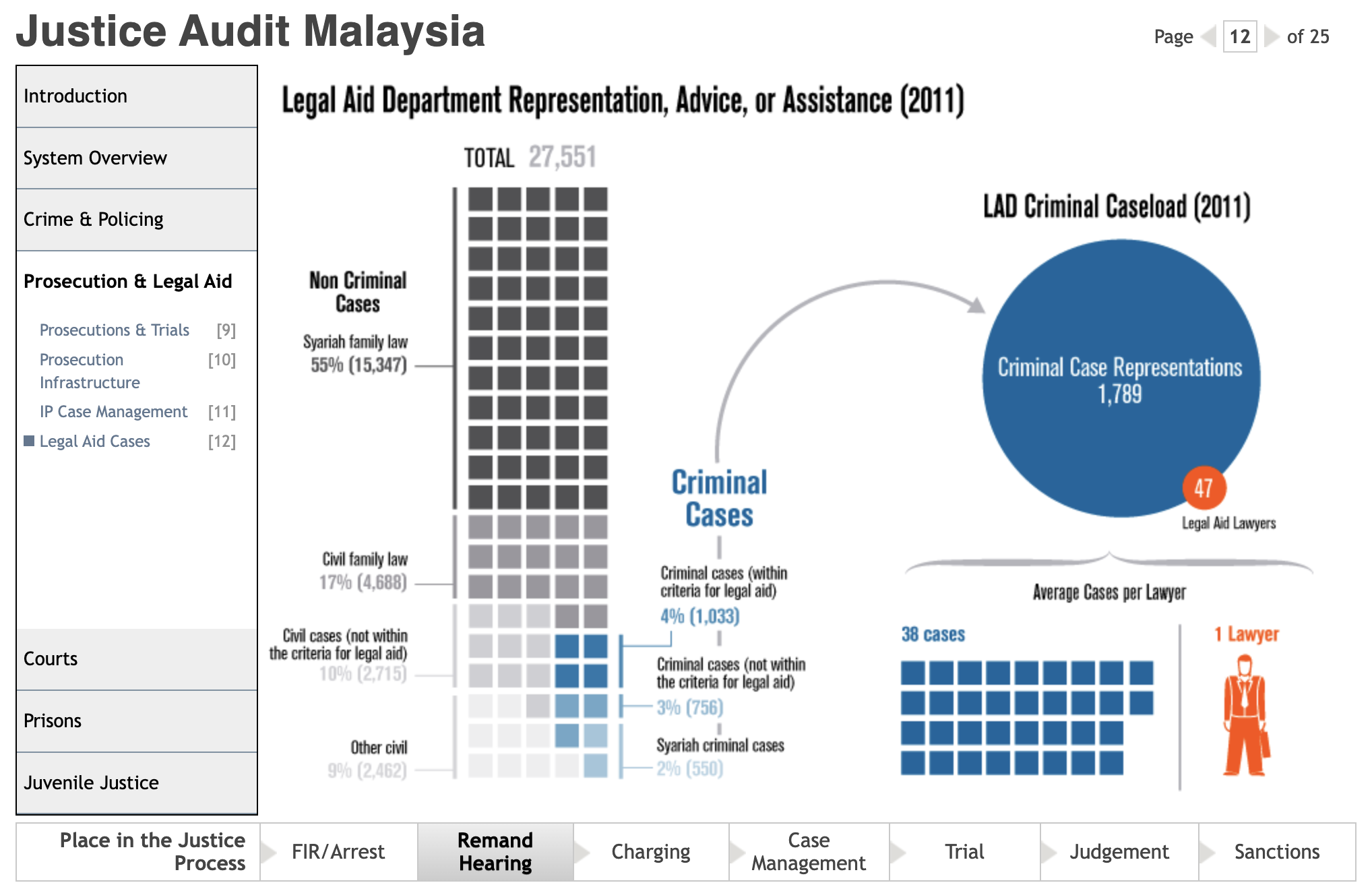Insights - Helmand Province, Afghanistan
Over 90% people live in rural areas, 40% income derived from opium, 8% literacy rates in men and 1% in women.
Police, prosecutors and prison officers salaries below average monthly shopping basket Afs 20,000 ($444).
Disputes / offences are resolved by local elders and mullahs.
The statutory justice system ‘does not work’ for ordinary people. Very slow: most cases appealed up to the Supreme Court in Kabul.
Perceptions that the statutory justice system is not fair - the poor have no access to legal advice nor assistance; the wealthy act with impunity. A person who lays an improvised explosive device may receive a sentence of one year, while a farmer exchanging opium for cash is sentenced to 15 years.
Insights - Malaysia
(1) Drugs dominate the criminal justice system:
- #1 cause of arrests
- Arrests doubled over 5 year period
- Majority of caseload in all subordinate courts drugs cases
- Over 50% remand prisoners charged with drugs related offences
- Government spend RM 172.3 million per year (approx $40 million) on drug offenders in prison.
(2) Prison overused: 70% sentenced prisoners serving less than 3 years (i.e.: lower end of the criminal scale of offending) and 26% prisoners are foreigners (overstaying).
(3) Significant proportion of young male offenders in prison (under 21) sentenced for statutory rape (i.e.: under-age partner).
(4) Absence of legal advice, assistance and representation – particularly at the time of arrest and detention and in the lower courts. Of 14,000 registered lawyers, it is estimated 300 are criminal law specialists.
With regard to gender…
<5% prisoners are women (compared with >7% in the Asia region - World Prison Brief 2022) - at the time, Malaysia did not disaggregate human resources by gender (e.g.: police, prosecutors, lawyers and judges/magistrates).
With regard to governance…
Perception that 'petty' corruption is decreasing (9% surveyed paid bribe to police in past 12 months) versus worsening in grand corruption (TI Corruption Perception Index: 2006 / 44th, 2010 / 56th, 2011 / 60th).
Insights - Bangladesh
(1) 87% people seek justice locally (informally) and avoid the police, lawyers and courts.
(2) The formal justice process is distant, slow and expensive (around half of court users surveyed indicated they had to travel between 1-4 hours to reach court; cases had been going on for 2-5 years; costs amounted to more than 4 times their monthly income).
(3) Connecting case data across police, courts and prisons showed 30% concerned drugs offences.
(4) When police and citizens were asked which criminal offences they most investigated / experienced, police responded: 34% drugs; citizens responded: 30% of crimes are quarrel / fighting (i.e.: neighbour disputes). Citizens’ experience of drug-related crime was minimal (just over 1%). Police had no data on neighbour disputes.
(5) Standing prison population: 77,000 - throughput of persons in prisons: <500,000 - 84% on remand (under trial) most of whom obtain bail within 12 months.
With regard to gender…
(1) 91% women felt safe in their homes at night.
84% felt safe in their neighborhoods at night.
(2) One Child Development Centre for girls in the country / only (under 9 to over 18) with 120 girls - 99% on remand - <50% held in 'safe custody' (for their own protection).
(3) 24% judges are women; 20% magistrates are women; 13% lawyers are women.
(4) <4% prisoners are women (most of these women are eligible for probation).
(5) Nari O Shishu tribunals (dealing with the prevention of crimes against women and children) conviction rate: 0.5%.
With regard to governance…
The office of the Public Prosecutor (and Assistant PP) sit under Ministry of Law
Prosecutors paid daily fee rate BDT 250-500 (USD 2.50 - 5) varying on the level of court
Allocation of Government funds to the justice sector is overall low and disproportionately favours police over the other justice service providers.
IMPACT
Bangladesh:
(1) Data from Justice Audit 2014 in five pilot districts resulted in the commission of a national Justice Audit 2018 by the Ministry of Law.
(2) Findings of JA 2018 informed government's 8th 5 Year Plan 2020 - 2025: twin policy shift (a) to a focus on the resolution of simple disputes at the local, village, level; and (b) filtering cases away from court and clearing cases clogging the courts at district level.
(3) Court Audit commissioned by the Ministry of Law to explore causes of case backlogs in the courts and identify solutions.











